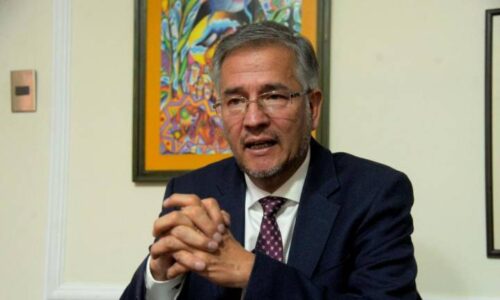

Journalist
6 December 2021
Marches and Hangovers
And the Movement Towards Socialism (MAS) march reached La Paz, there were a few effusive speeches, the usual adjectives, the occasional threat of the usual against companies and businessmen, and even a few presidential tears to thank such a demonstration of support, but that’s it.
Not to mention the numbers. In the MAS they said that the march was more than 100 kilometers long, but they did not reveal that between column and column of marchers there were several meters of distance, and between social movements, a few kilometers. So, being relatively precise, it should be noted that it was a march similar to other marches because, in the end, it was only enough to fill the Plaza de San Francisco in La Paz, which even in the best times of the Popular Democratic Unity (UDP) did not exceed 60 to 70 thousand people, a little more than the Hernando Siles, the largest stadium in the country (45 thousand spectators).
Other chronicles mention the tons of garbage accumulated in the city, the desolate public offices whose employees had to clock-in in the streets to avoid being unemployed, the enormous amount of money that is needed to mobilize and feed people, and the feeling of sadness that public spaces always leave behind when the “masses” disappear to continue with the routine of their lives.
The march changed nothing. A week later, the President continues to have the same problems as before the mandatory social walk and does not compensate for the loneliness of power or with the solidary and fleeting embrace of the crowds, or with the proclaimed loyalties of those who accompany him on the front lines.
Perhaps because deep down he knows that not all those who attended did so voluntarily and that even the support of those who were by his side is subject to a variety of conditions, Luis Arce shed a few tears, the kind that only official photographers record and that do not appear on the front pages of the newspapers, because nobody believes much in the cry of the powerful.
The day after the demonstration, Luis Arce returned to silence, the kind that leaders feel when they are left alone at their desks and calculate with more anxiety than ambition the time that still lies ahead. Perhaps he will hear as an echo the “Lucho, you’re not alone, damn it”, but only he knows how far those words can be from reality. Loneliness is not necessarily a weakness. It is a void that surrounds the decision chair.
The marches pass, but the consequences remain. Santa Cruz is further away from the Government than ever after, from the vociferous demands shouted on stage, some clueless union leader threatened to nationalize the companies that the Santa Cruz people created. They are the voices that seek applause, the impact of a phrase, the “comrades we are going to take away their industries from the rich, even if we don’t know what to do with them later”, “create one, two, three Vietnams and so on until they all starve to death”. Talk is cheap!
Beyond the anecdotal, there remains the feeling that, deep down, the other leaders of the march think the same and that, if the conditions were given, they would not hesitate to take that path. The “nationalizers” have not completely disappeared, even in words, because, in fact, their experience has been more than bad. Perhaps, for this reason, the President did not refute the head of the Bolivian Labor Union (COB), nor did he offer an apology. Anger, resentment, and that obsessive desire for revenge are used more than good sense to govern.
There is a sense of disorder in the country that is only aggravated by demonstrations of force. When the international news reports on the events of the past week, they say that Arce led a march that was organized to back him up. It seems like a joke, but it is not, because the President was there, so far from the Palace and so close to disorder and partisan uproar.
Almost at the same time, Evo Morales’ ex-girlfriend was coming out of jail “for good behavior” and “vocation for work.” Gabriela Zapata served part of her sentence for the crime of legitimizing illicit profits and left the prison in the Miraflores neighborhood of La Paz only on the condition that she did not approach anyone who had been part of the scandal.
The main suspect of organizing an influence-peddling network to benefit a Chinese company with millionaire contracts seems to have more rights than a former President, Jeanine Añez, who is accused of having been part of a non-existent coup d’état and remains locked up “preventively”. That is how the disorder is.
A few days after the march, the socialist government left workers from the airport administrator (AASANA) on the street and put airport security at risk because it needed to restructure the office without [having to deal with] strikes or conflicts. In the purest style of the liberal manual, he ordered the creation of a new entity to absorb less personnel than the other one had and thus kill two birds with one stone. And the legal problems? They will be solved along the way.
The pending issues add up for Arce. The arduous discussion with municipalities, regions, and universities about the scope of the Law of the National Development Plan remains ahead. The agreements will not be easy, because two opposing views on how to administer the State are at stake. It is not easy to negotiate after having insulted and that the Head of State knows more than ever after the passing euphoria and the shouts of the Plaza de San Francisco.
Far from the noise of the demonstrations, the news is still “boisterous”. They say that the gas reserves of the Argentine fields of Vaca Muerta will leave us without a market in a very short time and that the hen will stop laying the “golden eggs” that it laid during the blessed decade that filled the public coffers with money. Goodbye to the golden age of gas is very close.
If to all this we add that there is a new variant of COVID 19 (OMICRON) that could put a stop to the recovery and return us to the times of restrictions, the scenario ahead of us is not encouraging at all.
The President learns about all these things in the solitude of his office, where the armored glass prevents the noise of the demonstrations from reaching and only the clink of the spoons in the fine teacups that survive from the old crockery acquired much more than a century ago by President Montes is heard.
No, things are not resolved with large demonstrations and Luis Arce knows it, especially now that, after a year in office, he can no longer compare himself to Jeanine Añez. Lonely, he only has to look at himself in his own mirror. It is the hangover of the marches.
Source: http://www.cabildeodigital.com/2021/12/marchas-y-resacas.html




